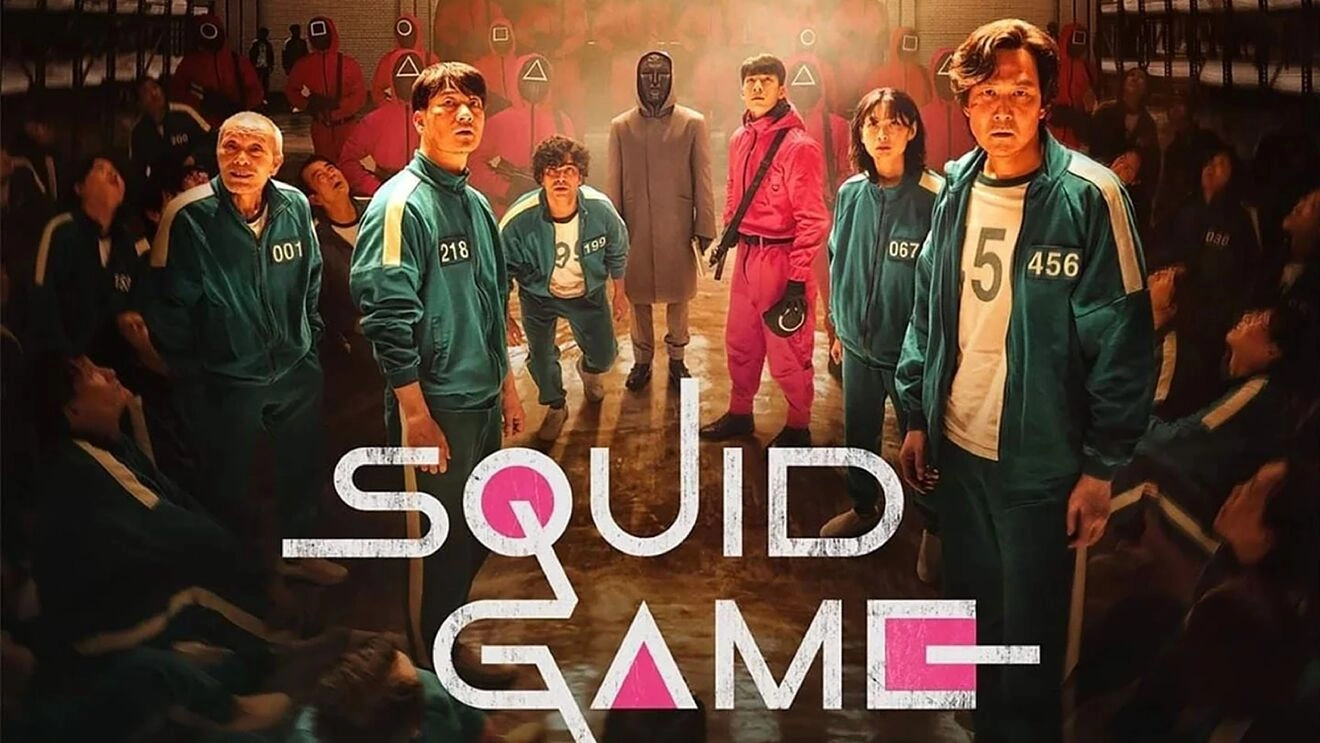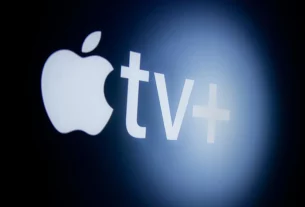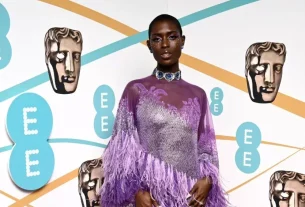Open the transcript of “Squid Game” on Netflix, the most conspicuous thing is the series of “1” in the last hot ranking column of the regional list.
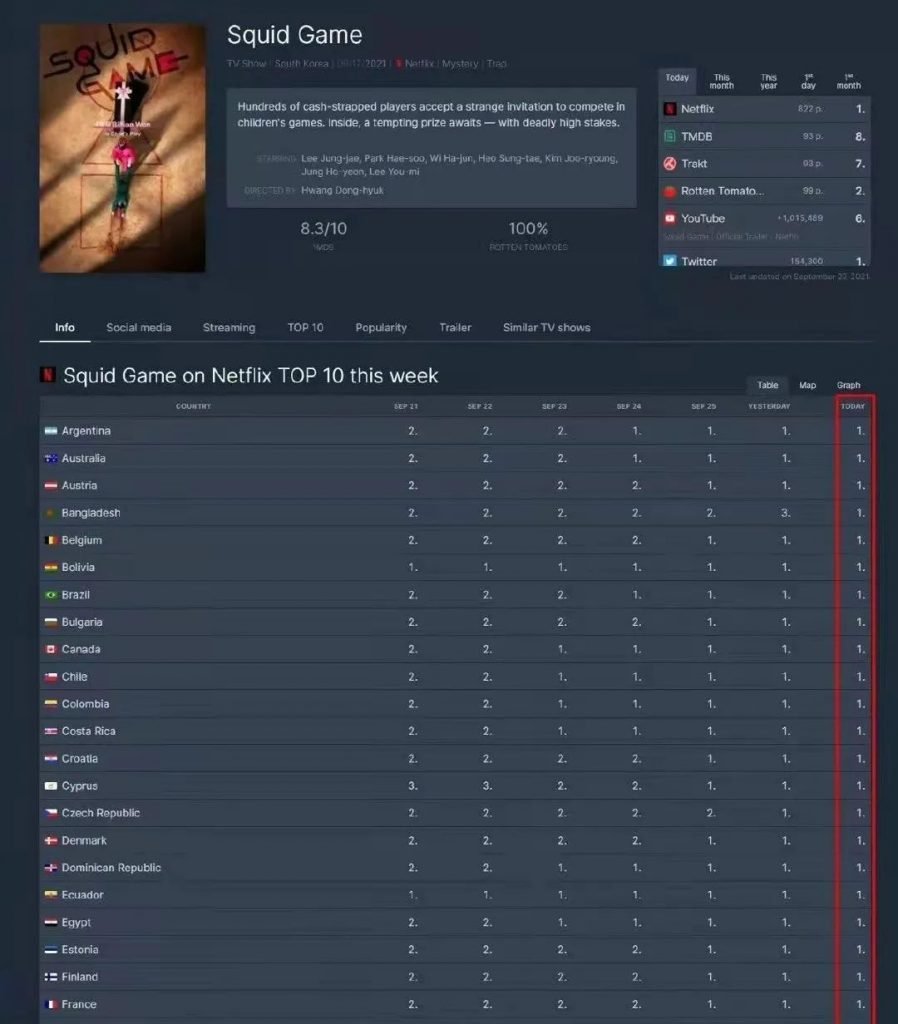
That’s right, this Korean drama “Squid Game”, filmed by a Korean director, starring Korean faces, and speaking Korean, has won the Top 1 hot list in more than 190 countries and regions covered by Netflix with 100% freshness of rotten tomatoes. And ranked first in the global popularity list for 9 consecutive days.
Riding on the “East Wind” of Netflix, “Squid Game” has become the most influential K-pop work in the world after “Parasite”.
On the ninth day of “Squid Game” meeting with the audience, Netflix and CEO Ted Sarandos publicly expressed their confidence in “Squid Game”.
“”Squid Game” is bound to become the most popular non-English drama in the history of Netflix, and may even become the most popular drama in the history of Netflix.”
Related Post: The high popularity of “Squid Game” can make it sign up for next year’s Emmy Awards?
It turns out that Ted Sarandos’s confidence is not arrogant.
Whether it is the popularity and influence of the “Sugar Cake Challenge” on TikTok that has swept the world, or related peripheral products that have been selling well on international e-commerce websites such as eBay.
They all proved the accuracy of Netflix’s estimation of the broadcast effect of “Squid Game”.
Behind it is the precise interpretation of Netflix’s “micro-type” algorithm for user orientation, and the gradual maturity of the industrialized creative model of creating strong product works under the guidance of algorithmic thinking.
Related Post: “Squid Game” may become the highest-rated drama in Netflix history.
Create a self-made brand, escort “Netflix Quantum Theory”
The Netflix billboard reads this sentence: “Don’t give up on your dreams.we started eith DVDs.”
This slogan with black humorous temperament instantly brought a realist inspirational atmosphere on Netflix.
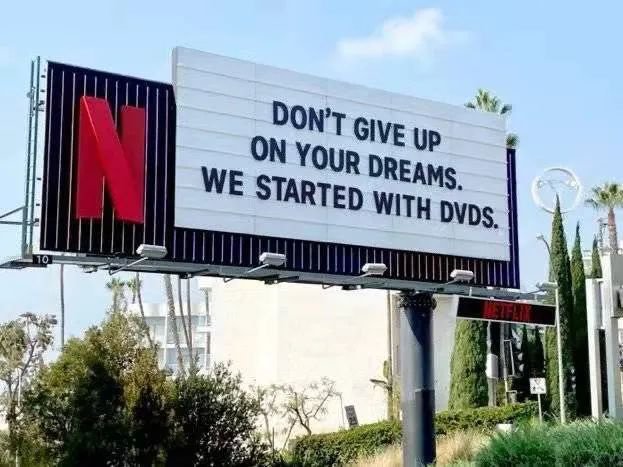
When Wilmot Reed Hastings, Jr. first founded Netflix in California in 1997, it was the golden age of the US video tape rental industry.
And Hastings, who was fined US$40 by Blockbuster for forgetting to return the DVD within the specified time, decided to join forces with the post office to start the mail DVD rental business.
Hastings discovers user needs in a certain business model, and constantly explores and upgrades the business philosophy of services based on this demand.
From the initial DVD mailing rental business of Netflix to the later transformation of the streaming media platform, the underlying logic of Reed Hastings to attract users has never changed.
Related Post: “Squid Game” is on fire, why South Korea, which loves to imitate, can always create excellent works through “plagiarism”?
When the self-made model has not yet been affirmed by the market, most film and television content platforms choose the “Guangshawang” copyright purchase model to “take the market by volume.”
In this environment, in 2012, Netflix launched its first original TV series “Lilyhammer” to start the era of self-made platforms.

Today’s Netflix has long become a film and television content producer that can represent Silicon Valley’s confrontation with Hollywood.
After accumulating the reputation of many works, the impression of “Netflix produced, must be a boutique” has been deeply left in the hearts of global audiences.
The successful creation of this kind of self-made brand is inseparable from the production and marketing idea of ”audience-centered” pursued by Netflix.
Netflix’s big data system “escorts” film and television works on the platform in various aspects such as production and user recommendation.
First of all, in the self-made stage, Netflix is one of the first companies in the world to apply data algorithms to plot point design and editing thinking.
Related Post: “Squid Game”: Netflix Asia Pacific Director Minyoung Kim interprets the secret of success of the series .
Under the guidance of the algorithm, Netflix has very strict requirements for the arrangement of plot points.
Especially in the first half of the episode, a Hook will appear every 15 minutes or so to continue to attract the attention of the audience.
In this way, the fast-paced, high-intensity intensive information attracts viewers to keep watching from the beginning.
But this “algorithm first” model is not perfect.
Take “Squid Game” as an example. Although the high-energy clips that appeared in the early stage ensured the user’s viewing time, they also broke out in a crowd of battle royale works.
However, the key information points and plot points in the first half are too densely set.
Related Post: “Squid Game”: One, two, three, wooden people, you will die if you are caught.
This leads to a clear sense of separation between the first half of the story, whether it is fluency or richness, after entering the second half of the plot.
This is why “Squid Game” is also surrounded by “unfinished” reviews despite its high popularity.
In fact, reviewing Netflix’s self-made works, far more than “Squid Game” was criticized.
In the second season of “킹덤 Season 2” (Kingdom: Ashin of the North), which was launched last year, the word-of-mouth evaluation differed greatly from the first season.
“Love, Death&Robots”, which scored as high as 9.2 on Douban, only got a score of 6.7 in the second season.
And this situation does not only appear in self-made works. The two dramas “Itaewon Class” and “Crash Landing on You”, which were purchased by Netflix for exclusive broadcast rights, also gained high popularity and there were word-of-mouth disputes near the end.
The model of algorithm-guided creation is not yet mature, but Netflix’s algorithm recommendation is a great tool to ensure its user experience.
According to the introduction of Netflix’s official website, the biggest difference from other streaming media platform recommendation systems is that Netflix is highly refined on top of the traditional film and television classification.
And this highly refined type is called “micro-genre”.
As early as 2006, Todd Yellin, Netflix’s vice president of products, led the team to attach “micro-tags” to film and television content.
That is, under the traditional categories of “comedy”, “horror”, and “romantic”, each category is decomposed.
According to a unified standard, the traditional film and television classification is subdivided again, and Netflix calls it “Netflix Quantum Theory”.
The rule is summarized as “film micro-type = region + adjective + film type + creative source + set time + storyline + content + suitable viewers +…”.
According to data, Netflix currently has 76,897 micro-type classifications.
According to “Netflix Quantum Theory”, “Squid Game” will be labeled “Korea” + “Thriller” + “Suspense Crime” + “Childhood Game” + “Contemporary” + “Battle Royale” + “19+” and more Label.
Then, the recommendation algorithm will push the show to users who are interested in such works based on these tags.
Globalization thinking: use the temperament of American dramas to “upgrade” Korean dramas
Yesterday, Netflix related sources revealed that the “Squid Game” starring group will appear as a guest on the well-known American talk show “Jimmy Fallon Show”.
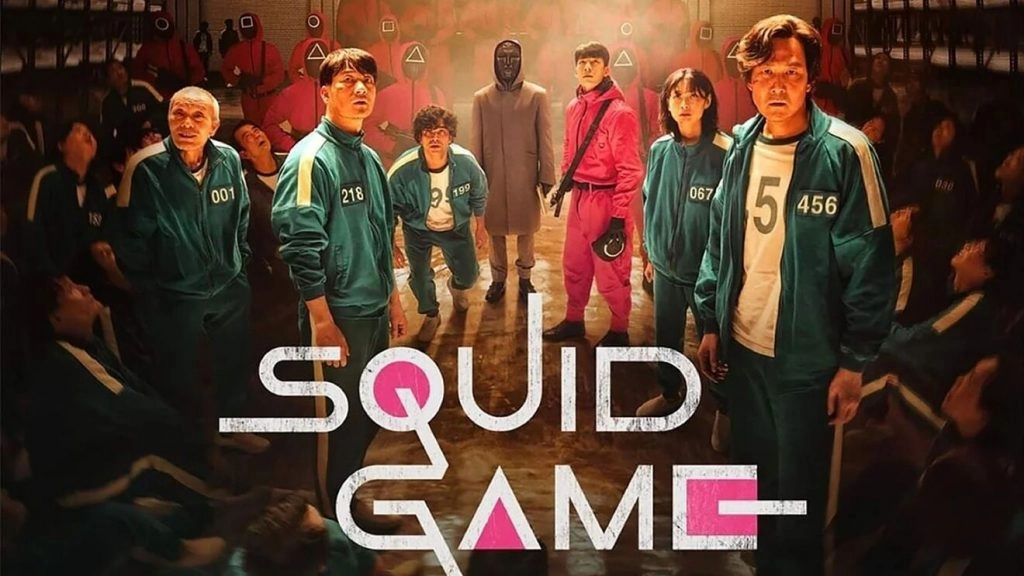
Although it is not new for Korean artists to appear on this show, it also shows that “Squid Game” has reached the popularity of Kpop songs in the United States.
In fact, from a production point of view, the explosion of “Squid Game” in Europe and the United States is not unexpected.
Because this is a Korean drama with a strong American drama temperament.
Related Post: Demystifying the behind-the-scenes shooting of the hot Korean drama “Squid Game”.
Some scholars summed up the production of “beautiful drama” as “funding + taste + innovation + positioning = hot money”, and this formula perfectly fits Netflix’s idea of creating “Squid Game”.
According to public data, the production cost of a single episode of “Squid Game” is about 2.5 billion won, and the total production cost of nine episodes in the first season reached 20 billion won.
From the standpoint of a single set of books, “Squid Game” is also a big investment among Korean dramas that generally have low investment.
The big investment brings exquisite visual experience to the audience, especially the game plot in the play is based on childhood games.
The game itself is not good enough, so it needs to match the scene, performance and other elements to attract the audience.
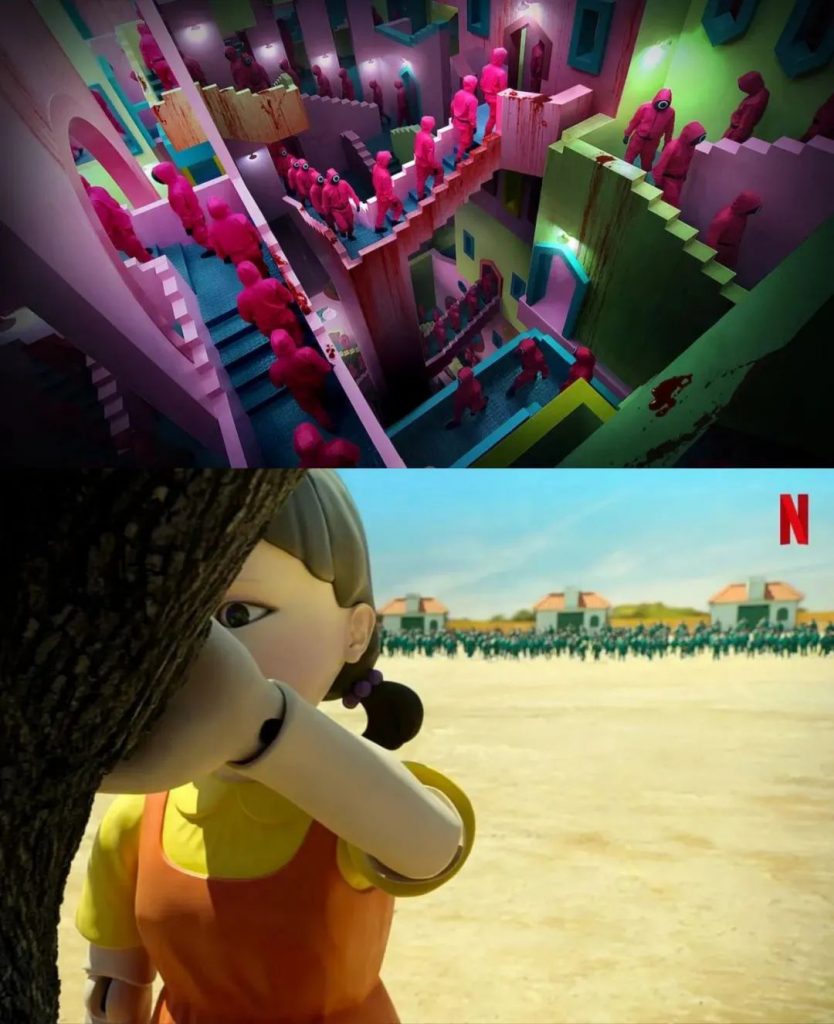
In the play, the “Red Mansion” designed by Spanish architect Ricardo Bofill, built 1:1, and the huge weird doll, also succeeded in leaving a deep impression on the audience.
Unlike other battle royale works, “Squid Game” did not choose dark colors to create the tension of survival games.
The game part of “Squid Game” mostly uses childish colors such as simulated outdoor light and candy color to contrast with dangerous and bloody games.

It can be seen from the audience’s evaluation that the game part is a bit like watching Han Zong’s outdoor games, that this shooting method can temporarily let the audience relax the tension of watching the drama and concentrate on the game itself.
At the same time, in the setting of the main characters, the Korean dramas produced by Netflix represented by “Squid Game” also contradict the characterization routines of Korean dramas.
The male protagonist has changed from a complex role that cannot distinguish between good and evil to an idealistic “perfect” personality.
For example, the male protagonist played by Jung-jae Lee in “Squid Game”, although he was set to be a gambler in the early stage, he always bursts out with the brilliance of humanity at important game nodes, and it continues to the end.
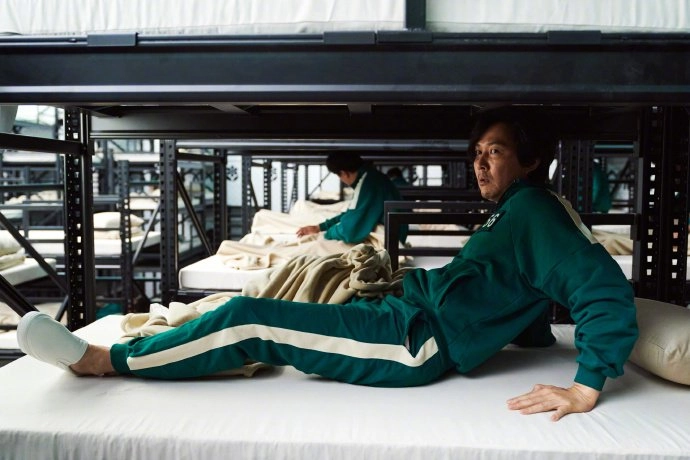
In addition to Seong Gi-Hun, Crown Prince Yi Chang in “The Kingdom” also belongs to the same type of rationalist role.
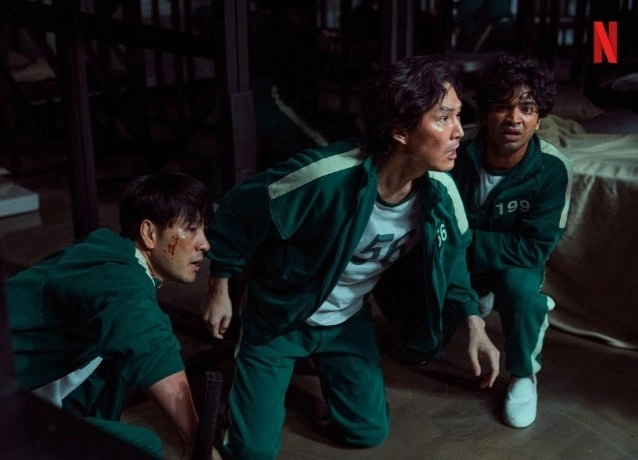
In terms of female roles, female representatives of the new era are beginning to appear. The heroine is not necessarily beautiful and cute, but has the power to match or defeat men.
Such as Sae-Byeok in “Squid Game” and Jo Yi-seo in “Itaewon Class”.
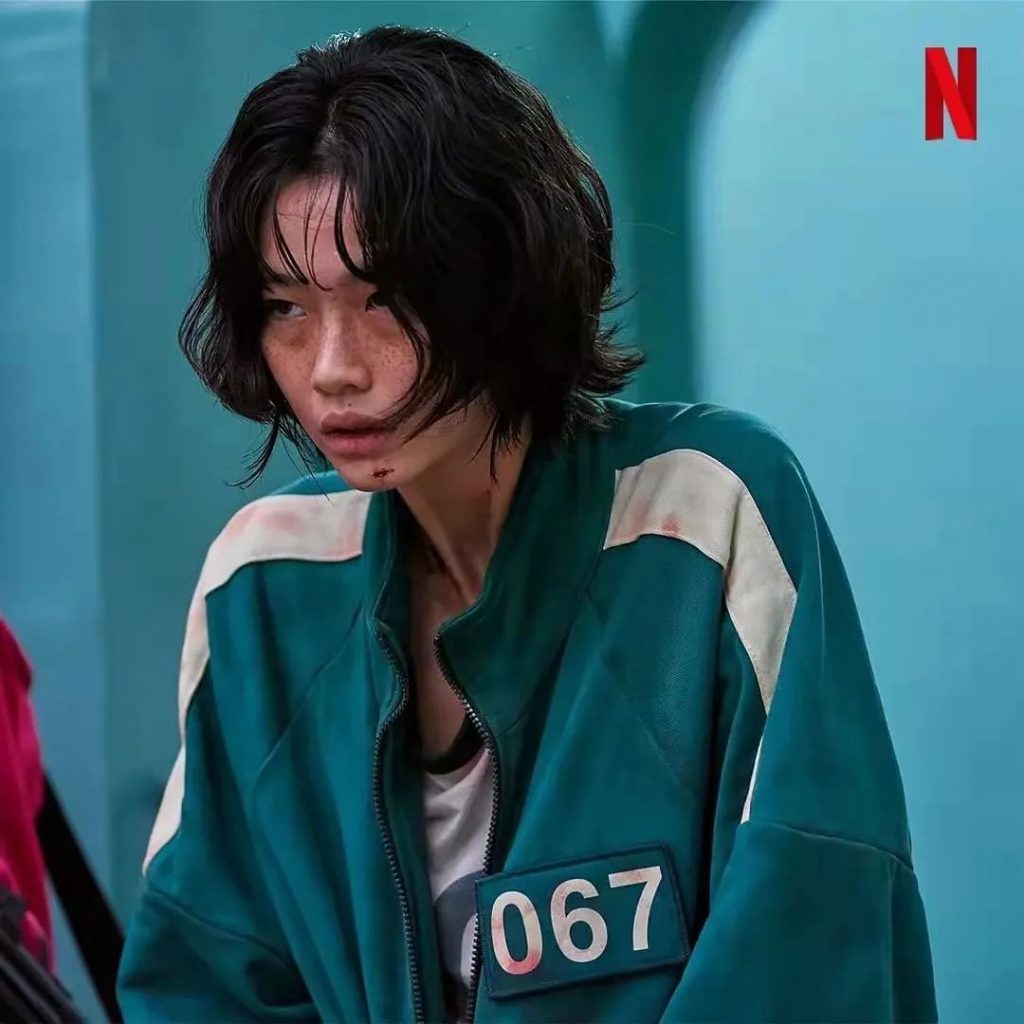
Netflix tries to bridge the gaps and regrets between TV dramas and reality while ensuring that Korean dramas directly criticize and reflect on social phenomena in the interconnected age by changing the form of the protagonist’s setting.
This allows the audience to obtain alternative compensation and psychological comfort from the play.
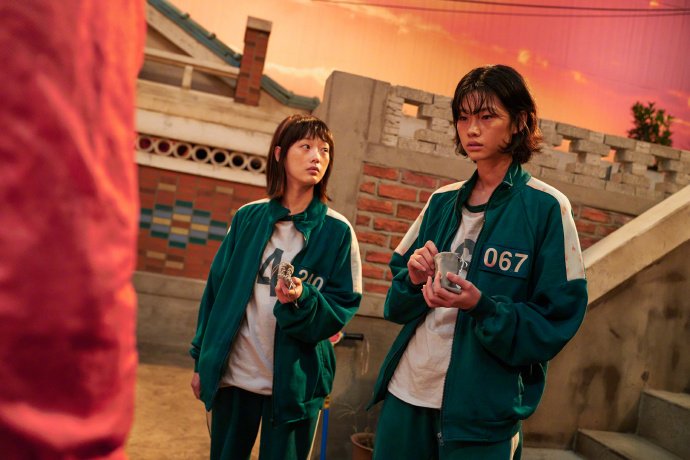
However, the protagonist of “Simultaneous Goodness” can guarantee a sense of refreshment and facilitate the audience to bring in themselves.
But at the same time, it will also lose to a certain extent the power of criticism of the reality of Korean dramas.
This may be one of the reasons why “Squid Game” is not highly rated in Korea.
If Netflix wants to enter the Korean market, it is naturally not enough to blindly cater to European and American tastes.
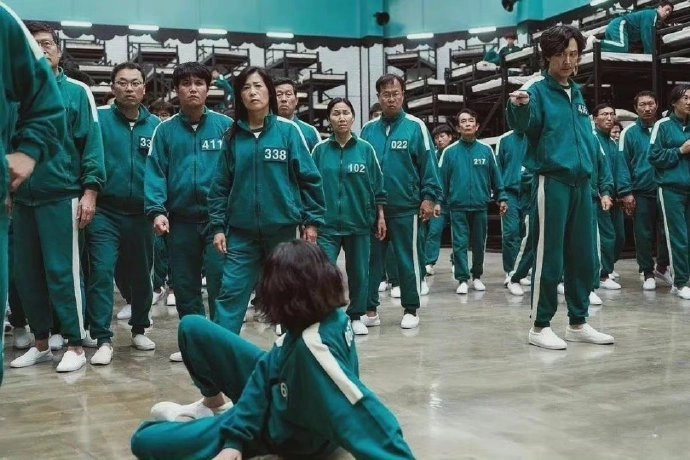
Netflix can be accepted by the Korean market, the most important point is the preservation of Korean local culture, and choosing local creators to cooperate is undoubtedly the safest and most convenient way.
In this “Squid Game”, Korean director Dong-hyuk Hwang’s alternative interpretation of Korean childhood games and his portrayal of the status quo of the bottom people in South Korea still retains a certain degree of “Korean drama sharpness.”
This year, Netflix has invested 700 billion won in content in Korea. In addition to “Squid Game”, there are “Hellbound” and “Money Heist” (종이의 집) and other works waiting to be launched.
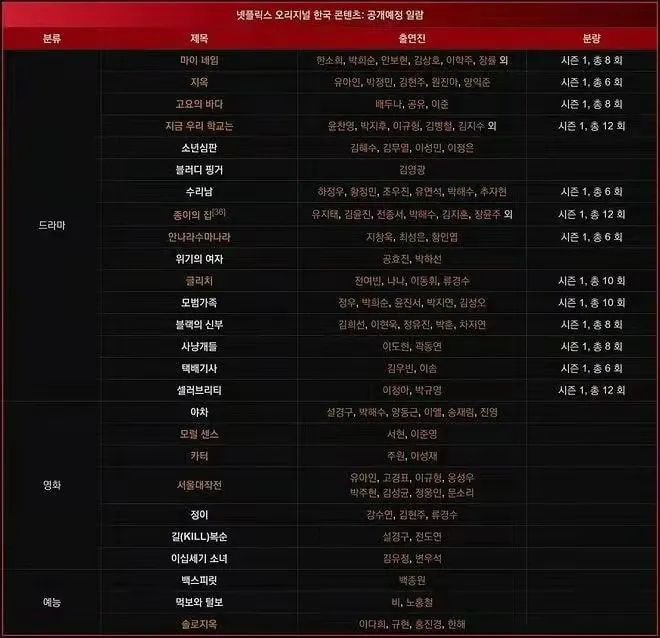
Yoo Ah In, Ji Chang Wook, Ha Jung Woo, Gong Yoo and other European and American “familiar” Korean stars are all starring.
“Squid Game”, a “premeditated” marketing
Overall, although “Squid Game” is not the best Netflix homemade work this year, it is undoubtedly the hottest one at the moment.
This phenomenon can also be seen from the continued popularity of “Squid Game” related peripherals.
According to the South Korean e-commerce platform auction, within one week of “Squid Game” airing, the sales of marble suits in the show increased by 860% from the previous month.
Sales of sports suits similar to the “Squid Game” gamer suit also increased by 188%.
The sugar pie set online on the US trading website eBay and the related set of “Squid Game” products are also very popular.
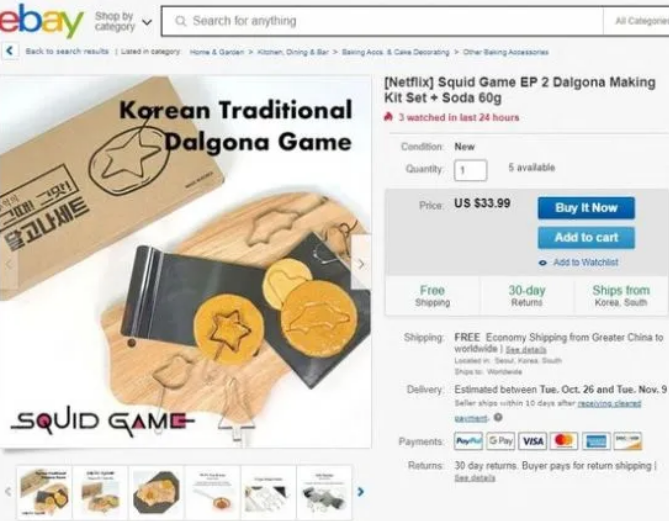
A relevant person in the North American industry added: “It is expected that on Halloween, “Squid Game” costumes will be very popular.”
In fact, in the pre-production stage, Netflix has made easy-to-use game links such as “sugar game” and “one-two-three wooden people” as its marketing focus.
Before the series started, Netflix set up a live-action “Squid Game” interactive exhibition area at Itaewon Subway Station in South Korea.
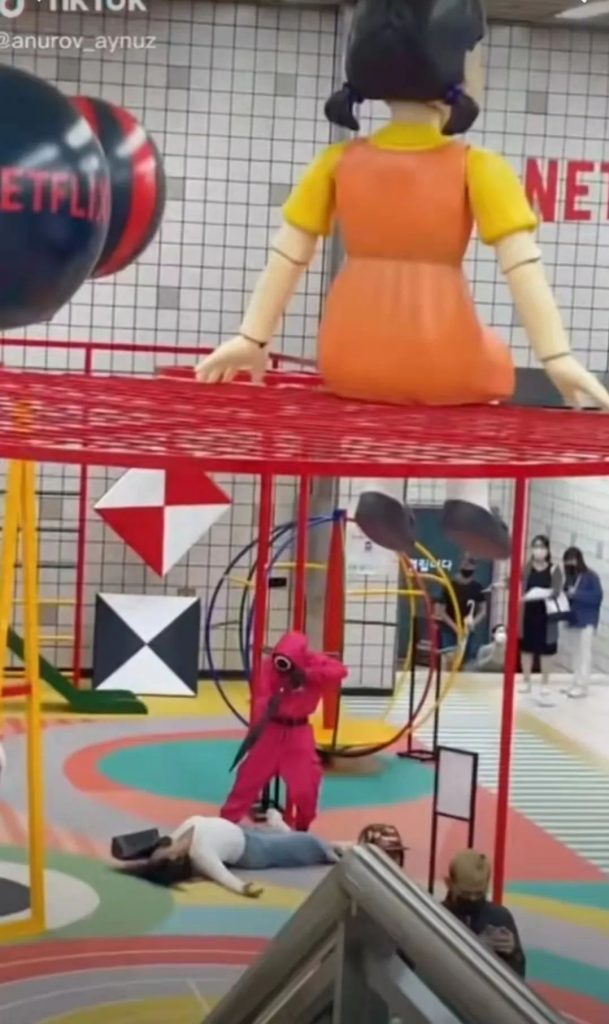
Netflix brings the elements of the play puppet doll, playground, piggy bank, pink NPC and other elements into reality to interact with pedestrians.
Even the interactive exhibition area was required to be dismantled in advance due to “cluster disputes”, “epidemic prevention and control” and other reasons because of its popularity.
Netflix has not only carried out large-scale marketing activities in South Korea.
In North America, Netflix launched the “XX challenge” video topic that fits the habits of TikTok users.
Netflix adapted the games in the play into interactive video challenge games such as “Sugar Cake Challenge” and “One Two Three Wooden Man Challenge”.
At present, the number of #SquidGame# related topics on TikTok has reached 10.6 billion.
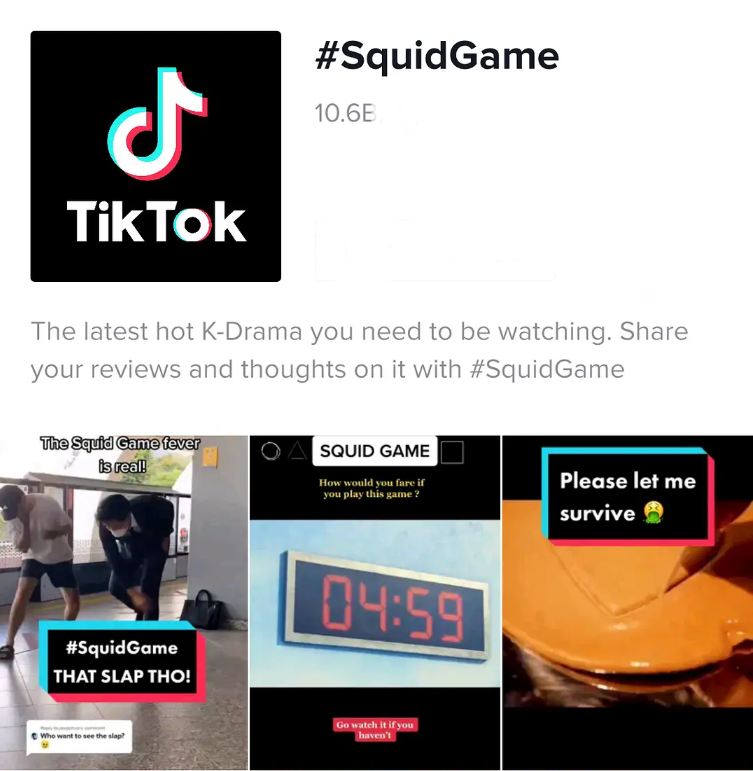
In order to increase game participation, Netflix also encourages viewers to restore online games in the show on Roblox, the world’s largest multiplayer online game creation platform.
One of the games named “Fish Game” quickly made it to Roblox’s official recommended ranking list.
Log in to YouTube and search for “SquidGame”, you can see a lot of videos that challenge the online “Squid Game”.
“Squid Game” can also be seen in other countries in Asia.
Netflix set up a giant puppet doll in the show at a zebra crossing in Manila, Philippines. When passers-by run through a red light, the doll will turn her hair and stare in red just like in the show.
This online and offline linkage, the danger of running a red light, combined with the plot in the play, helps the audience to experience the feeling of a “player” in the real world to a certain extent.

It can be seen from the successful path of “Squid Game” that whether it is in the pre-production or the design of subsequent marketing links, the user-centric product thinking has always been throughout.
However, although the advantages of big data algorithm orientation have been verified, but at the same time, the disadvantages such as word-of-mouth controversy and uneven quality of dramas have also begun to emerge.
How Netflix makes good use of its “algorithm” magic weapon, and how other video platforms can learn from this successful model, still need to continue to explore.
Related Post: “Gisaengchung” followed by “Squid Game”, how did Korean film and television dramas conquer Hollywood.
